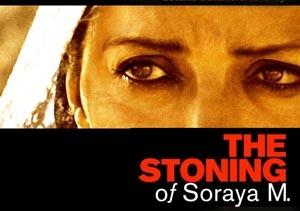Film Review: The Stoning of Soraya M.
"Don't act like the hypocrite who thinks he can conceal his wiles while loudly quoting the Koran." --Hafez, 14th c. Iranian poet.
The village of Kupeyah, Iran is the setting for this heartbreaking drama based on a true story. When French-Iranian journalist Freidoune Sahebjam rolls into town with car trouble, he is collared by Zarah, an intense, middle-aged woman with a story to tell. Over tea in her courtyard, with Sahebjam's tape recorder rolling, Zarah tells of a horrifying incident that had happened only yesterday. Her niece, Soraya Manutcheri, had been stoned to death. "Voices of women do not matter here," she says. "I want you to take my voice with you."
Soraya was a housewife much like any other, caring for her four children and making a home for her philandering and abusive husband Ali. But things begin to go terribly wrong when Ali takes a shine to Mehvi, a fourteen-year-old girl whose father is on death row at the prison where Ali works. Not only is Mehvi a chaste young virgin, she is the epitome of servitude in her household duties, and Ali wants her for himself. But on his salary as a mid-level prison administrator, he can't afford to support two wives. So, in hopes of gaining a reprieve for Mehvi's father in exchange for his daughter's hand in marriage, Ali sets out to divorce Soraya.
With the help of Mullah Hassam, the town cleric, Ali tries to convince Soraya that divorce would be best for all concerned. He would take his two sons to live with him in the city, while Soraya would remain in Kupeyah with her two daughters. And when Soraya refuses, Ali sends Mullah Hassam to propose the notion of Soraya becoming his sigheh, a "holy whore," as Zarah puts it. Again, Soraya refuses. At this point, Ali has little choice to achieve his ends except to find a way to accuse Soraya of marital infidelity, a crime for which a woman may be stoned to death under Islamic law. And as dark providence would have it, fate plays perfectly into Ali's hands.
Coincidentally, Hashem, the town mechanic with whom Sahebjam had left his car for repairs, had recently lost his wife to a terminal illness, and Soraya had taken a position in his household to help care for his developmentally-disabled son. Seizing the opportunity to use this as a plausible venue for Soraya's infidelity, with a little menacing coercion from Mullah Hassam, Ali convinces a reluctant Hashem to participate in his scheme. A hearing before Mayor Ebrahim ensues, but despite his skepticism, he is bound by law to declare Soraya an adulteress and order her to be stoned to death.
Written and directed by Cyrus Nowrasteh, The Stoning of Soraya M. is as beautifully crafted as it is painful to watch. Pacing and character development are flawless, and performances by a perfectly cast ensemble of actors make this film so convincingly realistic that its visceral effects are undeniably palpable and the scar that it leaves on the psyche is indelible. Though not for the faint of heart, The Stoning of Soraya M. is one of international cinema's most powerful and significant works.
* * *
The Stoning of Soraya M. is available from Amazon.
* * * * *
 ThingsAsian
ThingsAsian

















